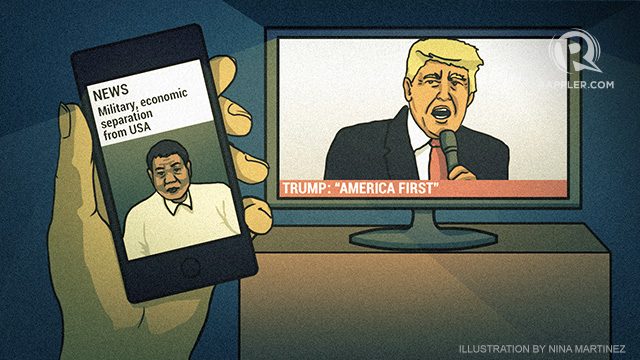SUMMARY
This is AI generated summarization, which may have errors. For context, always refer to the full article.

Part 1: The anguish of the Fil-Am in the age of Digong Duterte
(Part 2) So how can the American-Filipino Duterte supporter get out of this rut that he has found himself?
Some threaten that if the President’s anti-American, pro-China rants continue, they will just withhold their padala to the home country, which has now reached an annual high of $8 billion. There is, however, one problem with this warning. When people send funds back home, it is to help their family. Remittances are a private family affair and the nation-state only gets to be opportunistic by claiming that these dollars add to the national revenue.
Lobbying their legislators to hold back or reduce US aid to Duterte is another option. However, here the drawback has to do with the relationship of American-Filipinos to their domestic politics.
They may be the second biggest and fastest growing immigrant group in the country, but American-Filipinos are also the politically weakest. In the near-90 years since the first big wave of Filipinos moved to the United States, Filipinos now are the majority in Hawaii and California (1,474,707 in 2010 census; 43% of the total American-Filipino population).
The political dividend from this demographic dominance, however, has been pittance. American-Filipinos have only elected to office one governor (Ben Cayetano, Hawaii), and placed 3 in Congress including one senator (John Ensign). Not exactly a stellar record, which gives American-Filipinos a near zero bargaining political position.
Disgruntled and disappointed American Dutertistas can, therefore, threaten that American-Filipinos would hold on to their remittances unless Digong reverses his position, but this is – at best – an ant bite.
But is there something the two sides share, and if so, where layeth the love?
American-Filipinos may worry about President Rodrigo Duterte’s promise “to separate” the Philippines from its former colonizer, but this is not the case when it comes to one particular group within the community: the 25% who support Donald Trump. Duterte and Trump share a disdain over the United States’ superpower role, with the first wanting to break the country away from an American-determined foreign policy, while the other representing yet another variation of the American “isolationist” tradition. Not everyone is unhappy in this side of the Pacific with Duterte’s China pivot – it is good for Filipino nationalist well-being, and it saves the United States about $126 million that it promised the country for 2016.
Trump-the-sexual predator will most likely go down in flames on November 8, disappointing his American-Filipino supporters. But it is a temporary letdown. The National Asian-American Survey of 2012 showed that 46% of American-Filipinos vote Republican, and now that it has ceased to become a Party of Lincoln and mutated into the bathroom talkers of Donald, then pro-Duterte/pro-Trump American-Filipinos can remain optimistic that the “separate America” issue will not be pushed to the backburner.
And so you have these curious bedfellows of Pinoy Dutertistas, American-Filipino Trumpista-Republicans. To spice the divan you add Filipino nationalists, their communist cousins, the Marcos loyalists in one end of the Pacific Lake, and a bevy of pro-communist “solidarity” groups plus a sprinkling of “anti-empire” academics at the other end, and, voila, we have one of the weirdest love teams of all times. God only knows what kind of political sex goes on at the backroom.

r. Both approve of the targeted assassination of drug addicts and pushers. Duterte’s popularity in the United States is anchored on two issues – that he is “one of us” (non-elite), and that he will rid the country of drugs and corruption, the way he did it in Davao (be the systematic execution of drug suspects based on a list purportedly prepared by barangay leaders).
For the American-Filipino Republican-Trumpista, Digong is Pinoy Pride brandishing a Danao-made paltik Glock.
The solidarity also extends to the targets. Pro-Duterte American-Filipinos and Dutertistas-at-home care less about who is being shot these days. The poor does not figure prominently in the moral compass of those who support the killings. Both hate the blighted neighborhoods of their respective countries.
For the American-Filipino Republican-Trumpista, the Filipino poor are no different from those African-American “welfare mothers” who exploit the welfare system. If they are made to disappear from the scene all the better – that saves the government money and cleanses the city of its social muck. The Dutertista will gladly nod her head: the more the motorcycle two-some make more addicts disappear in Tondo or Honquera, the less dangerous these slums become, the more ready they are for middle-class and elite gentrification.
Hence, there is a lot of love between Dutertista at home and in the United States; only it comes at the expense of the poor. – Rappler.com
Patricio N. Abinales is an OFW.
Add a comment
How does this make you feel?
There are no comments yet. Add your comment to start the conversation.